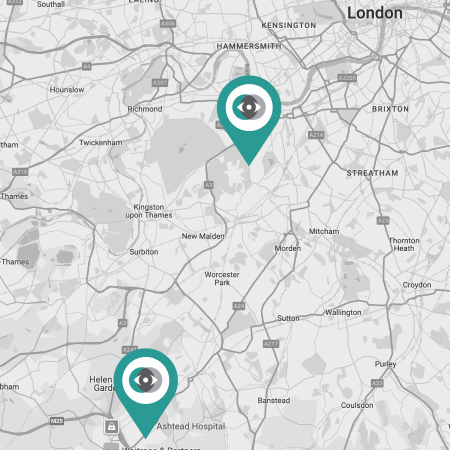
Can cataracts come back?
Cataracts are a common part of ageing. They cloud the natural lens of your eye, causing blurry vision, glare, and difficulty with daily tasks. If you've had successful cataract surgery, you may wonder: can cataracts come back?
The short answer is no-once a cataract is removed, it cannot return. But there’s a bit more to the story. Some patients develop a condition that feels similar, which can affect vision months or even years after surgery.
In this blog, we’ll explain what really happens after cataract surgery, what “secondary cataracts” are, and what you can do if your vision ever becomes cloudy again.
What is a cataract?
A cataract occurs when the natural lens inside your eye becomes cloudy. This happens slowly over time and is usually linked to age, though other factors like diabetes, certain medications, or trauma can speed up the process.
Cataracts affect your ability to:
- See clearly at all distances
- Drive safely, especially at night
- Read without strain
- See colours vividly
The only way to treat cataracts is surgery, where the cloudy natural lens is removed and replaced with a clear, artificial lens called an intraocular lens (IOL).
What happens during cataract surgery?
In cataract surgery, your surgeon—such as Professor Paul Ursell, an experienced lens and cataract specialist—removes the cloudy lens and inserts the new IOL.
This new lens cannot develop cataracts, which is why people say that cataracts “can’t come back.”
However, in some cases, patients notice blurred vision again months or even years later. That’s when another term comes into play: posterior capsular opacification (PCO).
What is a “secondary cataract”?
PCO is sometimes called a secondary cataract, though that’s not entirely accurate.
Here’s what really happens: during cataract surgery, part of the thin membrane that held your old lens (called the capsule) is left in place to support the new lens. Over time, cells from that membrane can grow across it, making it cloudy.
This can cause:
- Blurry or hazy vision
- Glare from lights
- Difficulty reading
- A feeling that your cataract has returned
PCO is common, and it’s not dangerous—but it can be frustrating.
How is it treated?
The good news is that PCO is easy to fix with a quick, painless laser procedure called YAG laser capsulotomy.
This treatment:
- Takes just a few minutes
- Is done in the clinic
- Requires no anaesthetic or downtime
- Instantly clears the clouded capsule
Vision typically improves right away. Once this laser procedure is done, the problem usually doesn't return.
How common is PCO?
PCO can occur in about 10–20% of patients within a few years of cataract surgery. It depends on factors like age, lens type, and healing response. Prof Ursell has been at the forefront of research on this topic throughout his career. He has published many academic papers on PCO and its incidence. They have some of the highest impact factors in the field of PCO research and are widely quoted by other surgeons throughout the world.
It’s not a sign that anything went wrong—it’s simply a known possibility, and easily treatable.
Can cataracts develop again in the other eye?
Yes. If you’ve only had one eye treated, a cataract can still develop in your other eye. In most cases, both eyes are affected by cataracts eventually, although one might worsen faster than the other.
What should you do if your vision becomes blurry again?
If you’ve had cataract surgery and notice:
- Cloudy or blurred vision
- Glare or halos
- Trouble reading
- Eye strain
…it’s important to book a check-up. A full eye exam will determine if you’ve developed PCO or another issue.
With the right care, you don’t have to live with reduced vision-even years after surgery.
Why choose Professor Paul Ursell?
Professor Ursell is a highly regarded specialist in private cataract and lens surgery. His attention to detail, personalised care, and use of advanced diagnostics mean patients receive top-tier results—and have full support even long after surgery.
Final thoughts
No, cataracts don’t come back. But if your vision becomes cloudy again after surgery, it may be PCO—a common, harmless issue that can be quickly treated.
If you're considering cataract surgery or have questions about your recovery, help is available.
Take the suitability self-test today to see if cataract surgery is right for you.
Are you suitable for vision correction surgery?
It isn’t suitable for everyone.
The first step is to book an assessment so you can find out whether you can benefit.
Our most popular procedures
What our patients say…
★ ★ ★ ★ ★“Excellent result. Complete confidence in Paul Ursell. Quiet, quick, and efficient. Peaceful and comfortable hospital.”
★ ★ ★ ★ ★
“The cataract surgery on both of my eyes went very smoothly without any problems. There was no pain afterwards and I didn’t have to wear any eyepatch. I would highly recommend Professor Ursell for cataract surgery.”
★ ★ ★ ★ ★“Highly professional, extremely efficient, and an excellent communicator, Paul exudes experience, knowledge, and ability. The whole process — initial consultation, operation, and post-op check-up — was wonderfully stress-free. I now have 20/20 vision, am glasses-free, and I am delighted by the results.”
★ ★ ★ ★ ★
“The cataract surgery has completely changed my life. Mr. Ursell put me at ease and explained all options. The procedure was quick and painless and completely successful, and I now have 20/20 vision in my good eye. One of the reasons I had the surgery was because of Mr. Ursell’s standing and experience. Cannot praise highly enough.”
★ ★ ★ ★ ★
“I was very short-sighted and my cataracts badly affected both reading and distance acuity. After the operation I now have very good distance vision (glasses-free) but still need glasses for reading. (This was the expected outcome as I did not want multi-focus implants). The operation was quick and painless, and I had no post-operative discomfort at all (which surprised me). The results are remarkable.
I can certainly recommend Professor Ursell. He is a personable consultant and a skilled surgeon.”
★ ★ ★ ★ ★
“Dr. Paul Ursell squashed many of my concerns for not having cataract surgery. He offered comfort with examples of his long/distinguished career and new technology that he applies to the surgery.
Both before and after the surgery, Dr. Ursell and staff gave me the information and attention I needed. It was a great success, and I highly recommend Dr. Ursell.”
We have replaced the images of real patients who provided these testimonials to protect their privacy.








